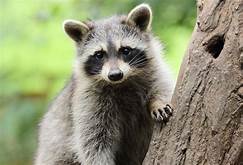Can You Keep Raccoons as Pets?
Raccoons are often seen as cute and furry creatures, but are they really suitable to be kept as pets? While raccoons can make entertaining companions, it is important to consider the challenges and responsibilities that come with owning one.

Legal and Ethical Considerations
1. Legality: Whether or not it is legal to keep raccoons as pets varies by state or country. Some areas may have restrictions or outright bans on keeping raccoons due to their potential to carry diseases or cause damage.
2. Ethical Concerns: Raccoons are wild animals and should ideally live in their natural habitats. Keeping them as pets can deprive them of the freedom to roam, forage, and interact with other raccoons, which can lead to psychological distress.
Behavioral Challenges
1. Destructive Behavior: Raccoons can be curious and mischievous creatures, often causing damage to furniture, household items, and even walls. They have strong claws and teeth that can easily scratch or puncture surfaces.
2. Odor: Raccoons have a strong, musky odor that can be unpleasant for many people. Additionally, they may mark their territory with urine or feces, further exacerbating the odor problem.
3. Biting and Scratching: Raccoons, especially when feeling threatened or stressed, can bite or scratch. Even if they are initially friendly, their wild instincts may take over in certain situations.
Health and Care Requirements
1. Diet: Raccoons have a varied diet in the wild, consuming fruits, vegetables, insects, and small animals. Providing a balanced and nutritious diet for a pet raccoon can be challenging and expensive.
2. Veterinary Care: Raccoons are prone to various diseases and parasites, some of which can be transmitted to humans. Regular veterinary checkups and vaccinations are essential for the health of both the raccoon and its owner.
3. Handling and Training: Raccoons can be difficult to train and handle due to their independent nature. They may not respond well to conventional training methods and may become aggressive if they feel mistreated.
In conclusion, while raccoons may seem like charming animals, keeping them as pets is not a simple matter. These animals have specific needs and behaviors that can be challenging to manage, and their welfare should always be the top priority. If you are considering getting a pet raccoon, thoroughly research local regulations, potential health risks, and the ethical implications of owning a wild animal.
Declaration: All article resources on this website, unless otherwise specified or labeled, are collected from online resources. If the content on this website infringes on the legitimate rights and interests of the original author, you can contact this website to delete it.




